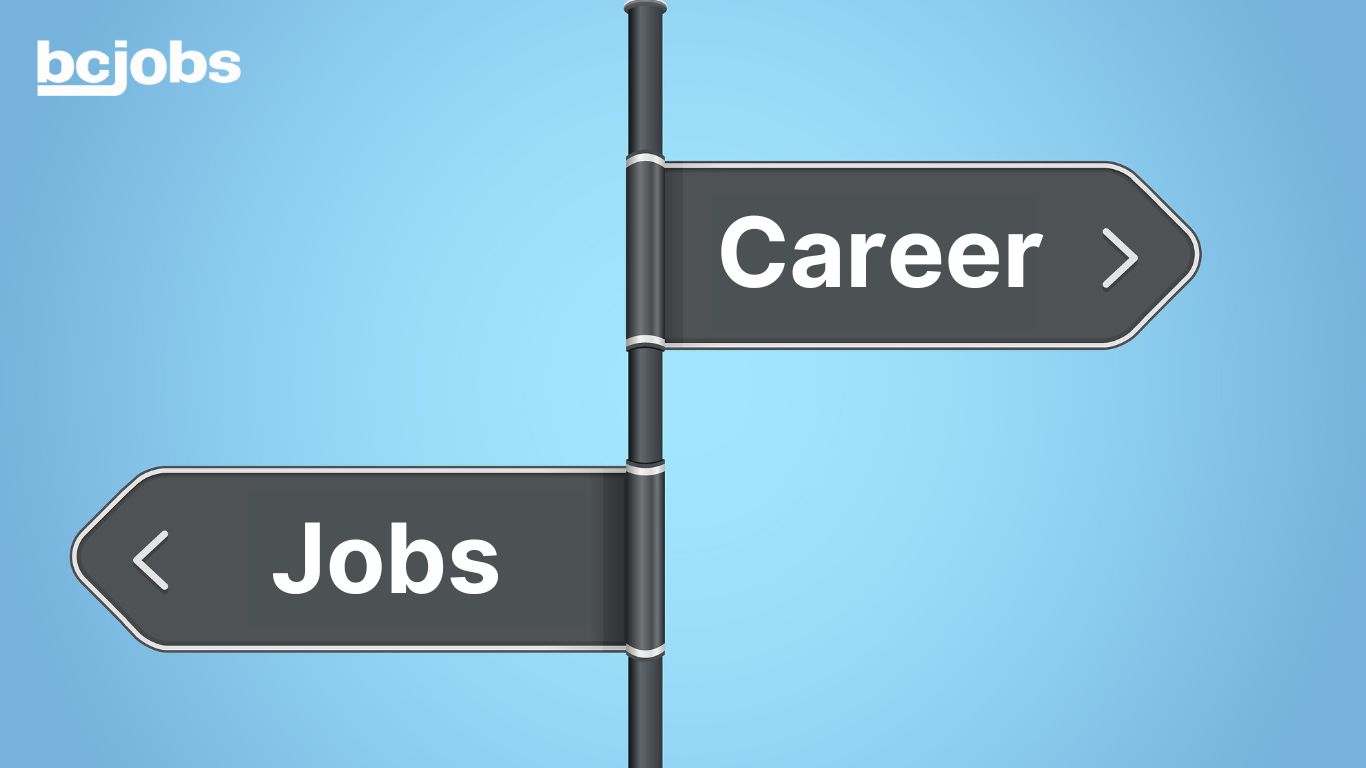When embarking on our professional journey, the terms ‘Career vs Job’ frequently arise, presenting a pivotal choice influencing our future. At first glance, these terms may appear interchangeable, yet they possess distinct meanings and implications.
A ‘job’ refers to a specific role or position within an organization primarily aimed at earning income. It is often seen as a short-term engagement or a stepping stone in one’s professional life.
In contrast, a ‘career’ is a series of interconnected employment opportunities, forming a long-term journey that encompasses personal growth, skill development, and professional advancement. The decision between pursuing a career and settling for a job shapes our professional trajectory and profoundly impacts our personal fulfillment and life path.
What is a Job?

A job is a role or position held within an organization or company primarily to earn an income. It’s often regarded as a means to meet immediate financial needs rather than a long-term commitment.
Jobs can be diverse, encompassing various forms such as part-time, full-time, or contractual engagements. This flexibility allows individuals to choose roles that fit their current life situations or schedules.
However, jobs typically do not offer the same level of personal growth or career advancement as a career path might. They are more about fulfilling present needs rather than focusing on future development.
What is a Career?

A career is more than just a succession of jobs; it’s a long-term professional growth and personal development journey. Unlike a job, a career is a series of connected employment opportunities where you earn a living and build and enhance your skills and knowledge. It’s characterized by a trajectory of growth, often in a specific field or industry, and is marked by upward progression in terms of position, responsibilities, or expertise.
A career is aligned with one’s aspirations and goals and involves continuous learning, adapting, and evolving professionally. It’s about creating a meaningful and fulfilling path that resonates with one’s values and professional ambitions.
Choosing Between a Career and a Job: Understanding the Long-Term Impacts
When faced with the pivotal decision between a career and a job, weighing the long-term impacts of each choice on your future is essential. While both paths offer distinct benefits and challenges, understanding these differences is crucial in making an informed decision that aligns with your personal and professional aspirations.
Pros and Cons of Jobs
Often characterized by specific roles within organizations, jobs are typically seen as a means to an immediate end – primarily earning a paycheck. Let’s consider ‘software engineer jobs‘ as an example. Such positions can offer quick entry into the workforce and immediate financial benefits. They are ideal for those who need to meet urgent financial obligations or seek quick, practical experience in a field like information technology.
Pros of Jobs:
Immediate Financial Benefits: Quick employment means immediate earnings, crucial for short-term financial stability.
Flexibility: Jobs can be part-time or contractual, allowing flexible working hours and commitments.
Diverse Opportunities: Fields like information technology offer a wide range of job roles, catering to different skill sets and interests. BC Jobs is the right place to look if you want to find the best information technology jobs.
Cons of Jobs:
Limited Growth: Jobs often have a ceiling regarding skill development and career progression.
Job Security: Many jobs, especially contractual roles, need long-term security.
Personal Fulfillment: Jobs might only sometimes align with one’s passions or long-term career ambitions.
Pros and Cons of Careers

In contrast, a career is a long-term journey through your professional life. It is marked by continuous growth, learning, and personal development. Careers are about earning an income and building a pathway that aligns with your personal and professional growth goals.
Pros of Careers:
Professional Growth: Careers offer ongoing opportunities to develop skills and advance in your field.
Long-Term Security: A career path will provide more stability and security in the long run.
Personal Fulfillment: Pursuing a career often aligns with personal passions and provides a sense of achievement and purpose.
Cons of Careers:
Time and Commitment: Building a career requires time, effort, and often a significant upfront investment in education or training.
Rigidity: Some career paths can be rigid, offering less flexibility regarding changing fields or roles.
Delayed Financial Gratification: Unlike jobs, careers might not offer immediate financial benefits, as the focus is on long-term growth.
Aligning Your Choice with Your Future Goals
In determining whether a career or a job is the right path for you, aligning your decision with your long-term objectives and life goals is essential. This crucial step ensures that your choice serves your immediate needs and future aspirations, paving the way for lasting satisfaction and success.
Immediate Financial Stability
Opting for a job might be the most suitable choice for those prioritizing immediate financial stability. Jobs, including diverse roles such as those in sales and marketing, offer the opportunity to enter the workforce and start earning quickly. These positions can provide the necessary financial support in the short term and can be particularly beneficial for those who need to meet urgent monetary obligations.
Long-term Growth and Development
Conversely, pursuing a career is more fitting if your ambition lies in long-term growth and development within a chosen field. A career transcends beyond the confines of a single job, encompassing a series of connected employment opportunities and experiences that contribute to your professional growth. In a career, you invest time in building and honing skills, gaining deep industry knowledge, and developing a network that collectively propels your professional journey forward.
For instance, while sales and marketing jobs might initially satisfy immediate financial needs, a career in this field would involve progressing to roles with greater responsibility, such as leading marketing campaigns or managing sales teams. It’s a path marked by advancement, learning, and personal fulfillment.
Making the Right Choice
When aligning your choice with your future goals, consider the trajectory you envision for your life. Are you seeking a path that provides immediate results, or want to build a foundation for long-term success? It’s crucial to weigh these considerations and choose a path—a job or a career—that aligns with your personal and professional aspirations. Your decision should reflect where you are today and where you aim to be in the future.
The Role of Education and Skills in Career and Job

The significance of education and skills cannot be overstated in the professional world, whether you’re considering a job or a career. These elements are the foundation for professional growth, adaptability, and success.
For Jobs:
In the context of jobs, the role of education and skills takes on a more practical and immediate form.
Varied Educational Requirements: Unlike careers, jobs do not always require advanced degrees or extensive educational backgrounds. For instance, entry-level positions in many industries may only need a high school diploma or equivalent.
Specific Skill Sets: Certain jobs demand particular skill sets rather than broad educational qualifications. These skills could be technical, such as proficiency in a specific software, or soft skills, such as effective communication.
On-the-Job Training: Many jobs offer on-the-job training, allowing individuals to acquire necessary work skills. This practical approach is beneficial for those who learn better through hands-on experience rather than theoretical instruction.
Adaptability: In job settings, the ability to quickly adapt and learn new skills as required by the position is often more valued than formal education. Employers often seek candidates who can readily adjust to the dynamic needs of the job.
Short-Term Training Programs: Short-term training programs or certifications can be sufficient for many job roles. These programs are often tailored to impart specific skills needed for particular job roles, such as technical certifications in IT or vocational training in trades.
For Careers:
In contrast, careers often necessitate a more in-depth approach to education and skills.
Higher Educational Standards: Many career paths require advanced education, such as a bachelor’s degree, master’s degree, or other professional qualifications. This is particularly true for specialized fields like medicine, law, or engineering.
Specialized Skills: Careers usually demand a deep understanding and proficiency in technical skills. These skills are often developed and refined over a longer period through formal education, continuous training, and practical experience.
Commitment to Continuous Learning: A hallmark of a successful career is the commitment to lifelong learning. As industries evolve, professionals must update their knowledge and skills to stay relevant. This could involve attending workshops, pursuing further education, or staying abreast of industry trends and advancements.
Professional Development Opportunities: Careers often provide opportunities for professional development, including mentorship programs, professional networking, and career advancement resources. These opportunities allow individuals to not only improve their skill set but also to grow their professional network.
Alignment with Long-Term Goals: In a career, education, and skills are aligned with long-term professional goals. The focus is on building a comprehensive knowledge base and skill set to support career advancement and personal growth.
Balancing Passion and Practicality
Balancing your passion and practicality is critical to long-term satisfaction and success when making a career decision. This balance is crucial, impacting your overall happiness and fulfillment in your professional life.
Pursuing Passion:
Embracing your passion can lead to a deeply fulfilling career. Work doesn’t feel like a chore when you love what you do, and you’re often more motivated and engaged.
However, being realistic about the financial and personal sacrifices involved is essential. Passion-driven fields may only sometimes be lucrative, especially in the beginning. You should navigate periods of financial uncertainty or invest more time and resources into building your career.
Consider the long-term viability of your passion. Is there a market for your skills? Can your passion sustain you financially in the long run?
Balancing passion with a practical approach involves finding ways to monetize your skills or seeking out industries that align closely with your interests but also offer financial stability.
Being Practical:
Conversely, if you lean towards practicality, look for careers that offer stability, good prospects, and growth opportunities. These might not align perfectly with your passions, but they can provide a secure and comfortable life.
Choosing a practical career doesn’t mean giving up on your passions. You can always pursue your interests on the side, whether as a hobby or a side hustle.
Practical careers often come with clear progression paths, financial stability, and less risk. They are ideal for those prioritizing security and predictability in their professional lives.
Remember, finding enjoyment in a practical job is also possible. Many find satisfaction in mastering their roles, excelling in their field, and enjoying the lifestyle their job affords them.
The Importance of Flexibility and Adaptability

In our ever-changing world, flexibility and adaptability are beneficial and essential traits in both jobs and careers.
Flexibility in Jobs:
The job market can be unpredictable, with many industries experiencing rapid changes due to technology, economic shifts, and global trends. Being able to adapt to different roles or industries becomes a significant advantage.
This might mean learning new skills, switching industries, or even relocating for work. The ability to adapt ensures you remain employable and relevant in the job market.
Flexibility in jobs also includes being open to different types of employment – part-time, freelance, or remote – which can provide diverse experiences and opportunities.
Adaptability in Careers:
For those on a career path, adaptability is about long-term growth. It involves continuously updating your skill set and staying abreast of industry trends.
In a career, you’ll encounter various challenges and changes, such as evolving job roles, technological advancements, and shifts in industry practices. Adapting to these changes is vital for sustained growth and progression in your career.
Embracing lifelong learning, seeking professional development opportunities, and being open to feedback and new ideas are all part of being adaptable in your career. It’s about evolving with your industry and growing as a professional.
Navigating the Digital Age: Technology’s Impact on Careers and Jobs
The digital age has revolutionized our work environment, significantly impacting jobs and careers profoundly.
Impact on Jobs:
The advent of automation and advanced technology has replaced some types of jobs, particularly those involving routine or manual tasks. This shift underscores the need for workers to adapt by acquiring new skills that are less susceptible to automation.
Job security in the digital era is increasingly tied to one’s ability to keep pace with technological changes. Employees must be proactive in learning new technologies and adapting to digital tools and platforms that are becoming integral to various industries.
Furthermore, technology has also created new job opportunities, particularly in fields like data analysis, digital marketing, and cybersecurity, demanding specific tech-related skills.
Impact on Careers:
In terms of careers, technology has been a catalyst for innovation and the creation of new career paths. Fields like artificial intelligence, machine learning, and blockchain technology offer exciting career prospects that were unimaginable a few decades ago.
Updating with technological advancements is now optional but essential for career growth. Continuous learning and professional development in the latest technologies are crucial in maintaining relevance in an ever-evolving job market.
Technology has also democratized learning, offering access to online courses and certifications and enabling professionals to enhance their skills from virtually anywhere.
The Power of Networking and Mentorship
The roles of networking and mentorship are invaluable in navigating jobs and career paths.
Networking:
Networking plays a vital role in uncovering job opportunities and gathering career advice. Building a robust professional network can open doors to new positions, industries, and career insights.
It expands your professional contacts, providing a support system for peers, colleagues, and industry professionals. This network can be valuable for information exchange, collaboration opportunities, and professional guidance.
In the digital age, networking extends beyond traditional face-to-face interactions to include digital platforms like LinkedIn, which can be powerful tools for connecting with industry leaders and peers worldwide.
Mentorship:
Mentorship is a key factor in guiding individuals through their professional journeys. A mentor offers advice, insights, and perspectives based on their experience.
They can help navigate workplace challenges, offer career development strategies, and provide feedback to foster personal and professional growth.
Seeking mentors within or outside one’s current workplace can provide a broader understanding of the industry and aid in making informed career decisions.
Transitioning from a Job to a Career

Transitioning from a job to a career is a process that involves several key steps.
Identifying Long-term Goals: The first step is clearly defining your long-term professional aspirations. Understanding what you want to achieve professionally will guide your decisions and actions.
Acquiring Skills and Education: Depending on your career goals, acquiring additional skills or education might be necessary. This could involve formal education, online courses, workshops, or self-study to gain the expertise required for your desired career path.
Seeking Growth Opportunities: Look for opportunities within your current job that align with your career goals. This could mean taking on additional responsibilities, volunteering for projects, or shifting to a role with more growth potential.
Networking and Mentorship: Building a professional network and finding mentors in your chosen field are crucial. They can provide valuable insights, introduce you to opportunities, and offer guidance as you navigate your career path.
Balancing Personal Life and Professional Aspirations
Finding a balance between personal life and professional goals is essential for overall well-being and career satisfaction.
In Jobs:
When focusing on jobs, look for good work-life balance roles. This might mean opting for positions with flexible hours, remote work options, or a healthy work culture that values employee well-being.
Choosing jobs that allow you enough time and energy for personal pursuits and relationships is essential, as this balance is key to maintaining mental and emotional health.
In Careers:
In a career, getting caught up in long-term goals and ambitions is easy. However, ensuring that this pursuit doesn’t come at the expense of personal time and relationships is crucial.
Setting boundaries, prioritizing time management, and consciously separating work from personal life are vital. Remember, a fulfilling career allows room for personal growth and happiness outside of work.
Making an Informed Decision: Career or Job
Choosing between a career and a job involves thoroughly understanding your personal circumstances, goals, and values.
Seeking Advice: It’s beneficial to consult with professionals or career counselors who can offer an objective perspective and advice based on your interests and skills.
Self-Reflection: Take the time to introspect and understand your strengths, weaknesses, and interests. This self-awareness is critical in making a decision that aligns with your true self.
Future Trends in Employment
Staying informed about future trends in the job market and industries is crucial for making a well-informed decision about your career or job.
Emerging Industries: Keep an eye on industries that are growing or emerging. Sectors like renewable energy, digital healthcare, and remote work technology are areas with increasing relevance and opportunities.
Skills in Demand: Understanding the skills in demand now and in the foreseeable future can guide your learning and development efforts. Skills like digital literacy, data analytics, and emotional intelligence are increasingly valuable across various industries.
FAQs:
1. What’s the difference between a job and a career?
A job is a specific role aimed at earning income, often viewed as a short-term engagement for financial needs. It can be part-time or full-time. Conversely, a career is a series of connected employment opportunities focused on long-term professional growth and personal development.
2. How do I decide between a job and a career?
The choice depends on your immediate financial needs and long-term goals. If you need immediate financial stability, opt for a job. A career is more suitable if you’re focused on long-term skill development and growth. Consider your passions and commitment level before deciding.
3. Can I transition from a job to a career?
Yes, transitioning is possible. Start by identifying long-term goals, acquiring relevant skills and education, seeking growth opportunities, and building a professional network. Mentorship can also facilitate this transition.
4. Is networking important in building a career?
Networking is crucial in career building. It helps in finding opportunities, gaining advice, and expanding professional contacts. Strong networks can provide support and open doors to new possibilities.
5. What role does education play in choosing between a career and a job?
Education is important for both, but in different ways. Jobs may require specific skills or short-term training, while careers often need in-depth education and continuous learning. Your education level and willingness to learn can influence your choice.
Conclusion:
Choosing between a career and a job is a personal decision that significantly impacts your future. Carefully weigh your options, considering your current situation, future goals, and the ever-evolving job market.
Remember, your decision is not irreversible. You can always pivot and adapt your choices as your life circumstances change and the world around you evolves. Embrace the journey of finding what works best for you.
If you’re ready to explore the best job and career opportunities tailored to your skills and interests, visit BC Jobs. Discover a platform that connects you with many options and helps you make informed decisions about your professional future. Start your journey today at BC Jobs.
Tags: Career vs Job



